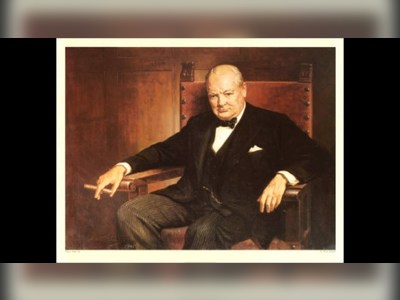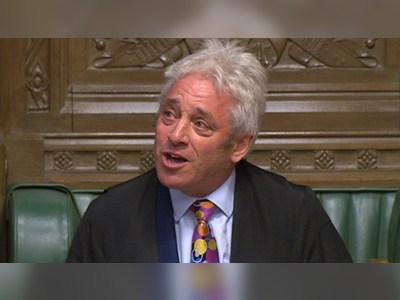British Heritage
Remember, Cherish, Learn.
beta
Margaret Thatcher "The lady's not for turning" 1980
Contribution of Margaret Thatcher's "The Lady's Not for Turning" Speech to British Heritage.
Margaret Thatcher's iconic speech, "The Lady's Not for Turning," delivered on 10th October 1980 at the Conservative Party Conference in Brighton, holds a significant place in British political history. It became a defining moment in Thatcher's career and laid the groundwork for her legacy as one of the most influential and polarizing leaders in modern British history. This article explores the speech's contribution to British heritage, its impact on Thatcher's political development, and its lasting effects on the nation.
The phrase "The lady's not for turning" encapsulated Margaret Thatcher's resolute refusal to change course in response to opposition from both her own party and political adversaries. It was a response to the criticism she faced due to her ambitious liberalization of the economy, which led to rising unemployment and a recession in the early 1980s. Critics, including some from her own Conservative Party, called for a "U-turn" in economic policies to address the challenges faced by the nation.
However, in her speech, Thatcher stood firm in her commitment to her policies and the long-term vision for Britain's economic revival. The defiant rhetoric solidified her image as a strong and determined leader, earning her the nickname "The Iron Lady." Thatcher's unwavering stance during this speech resonated with her supporters and established her as a symbol of conviction and strength.
"The Lady's Not for Turning" became a rallying cry for Thatcher and her supporters. It became a motto that epitomized her steadfastness and determination in the face of adversity. Throughout her tenure as Prime Minister from 1979 to 1990, Thatcher remained consistent in pursuing her conservative agenda of reducing the role of the state, promoting individual freedom, and advocating for a free-market economy.
Thatcher's policies, known as Thatcherism, left a lasting impact on British society. She implemented radical reforms that included privatization of state-owned industries, reducing the power of trade unions, and deregulating financial markets. Her government also pursued a tough stance on foreign policy, particularly concerning the Soviet Union and the Falklands War in 1982.
Margaret Thatcher's "The Lady's Not for Turning" speech contributed significantly to British heritage in multiple ways:
1. Political Leadership: The speech showcased Thatcher's strong leadership style, which emphasized conviction, decisiveness, and the courage to stand by one's principles even in challenging times. This legacy has influenced subsequent leaders and continues to inspire politicians in the UK and beyond.
2. Economic Reforms: Thatcher's economic policies reshaped the British economy, moving it toward a more market-oriented system. While her reforms sparked debates and criticism, they contributed to the country's economic growth and laid the foundation for future prosperity.
3. Social Transformation: Thatcher's emphasis on individual responsibility and the free market brought about a societal shift, promoting entrepreneurship and self-reliance. However, her policies also led to increased social inequality, and debates about their long-term effects remain a part of the British heritage.
4. International Standing: Thatcher's strong stance on foreign policy, particularly during the Cold War, solidified Britain's position on the world stage. Her leadership during the Falklands War bolstered national pride and strengthened ties with allies, asserting Britain's global significance.
In conclusion, Margaret Thatcher's "The Lady's Not for Turning" speech holds a special place in British heritage. It symbolizes her unyielding determination and the transformative impact of her policies on the country. Despite its controversies, her legacy continues to shape the political and economic landscape of Britain, leaving an indelible mark on the nation's history.
The Iron Lady's Defiant Stance
The phrase "The lady's not for turning" encapsulated Margaret Thatcher's resolute refusal to change course in response to opposition from both her own party and political adversaries. It was a response to the criticism she faced due to her ambitious liberalization of the economy, which led to rising unemployment and a recession in the early 1980s. Critics, including some from her own Conservative Party, called for a "U-turn" in economic policies to address the challenges faced by the nation.
However, in her speech, Thatcher stood firm in her commitment to her policies and the long-term vision for Britain's economic revival. The defiant rhetoric solidified her image as a strong and determined leader, earning her the nickname "The Iron Lady." Thatcher's unwavering stance during this speech resonated with her supporters and established her as a symbol of conviction and strength.
Legacy of the Speech
"The Lady's Not for Turning" became a rallying cry for Thatcher and her supporters. It became a motto that epitomized her steadfastness and determination in the face of adversity. Throughout her tenure as Prime Minister from 1979 to 1990, Thatcher remained consistent in pursuing her conservative agenda of reducing the role of the state, promoting individual freedom, and advocating for a free-market economy.
Thatcher's policies, known as Thatcherism, left a lasting impact on British society. She implemented radical reforms that included privatization of state-owned industries, reducing the power of trade unions, and deregulating financial markets. Her government also pursued a tough stance on foreign policy, particularly concerning the Soviet Union and the Falklands War in 1982.
Contribution to British Heritage
Margaret Thatcher's "The Lady's Not for Turning" speech contributed significantly to British heritage in multiple ways:
1. Political Leadership: The speech showcased Thatcher's strong leadership style, which emphasized conviction, decisiveness, and the courage to stand by one's principles even in challenging times. This legacy has influenced subsequent leaders and continues to inspire politicians in the UK and beyond.
2. Economic Reforms: Thatcher's economic policies reshaped the British economy, moving it toward a more market-oriented system. While her reforms sparked debates and criticism, they contributed to the country's economic growth and laid the foundation for future prosperity.
3. Social Transformation: Thatcher's emphasis on individual responsibility and the free market brought about a societal shift, promoting entrepreneurship and self-reliance. However, her policies also led to increased social inequality, and debates about their long-term effects remain a part of the British heritage.
4. International Standing: Thatcher's strong stance on foreign policy, particularly during the Cold War, solidified Britain's position on the world stage. Her leadership during the Falklands War bolstered national pride and strengthened ties with allies, asserting Britain's global significance.
In conclusion, Margaret Thatcher's "The Lady's Not for Turning" speech holds a special place in British heritage. It symbolizes her unyielding determination and the transformative impact of her policies on the country. Despite its controversies, her legacy continues to shape the political and economic landscape of Britain, leaving an indelible mark on the nation's history.
- The lady's not for turningen.wikipedia.org




